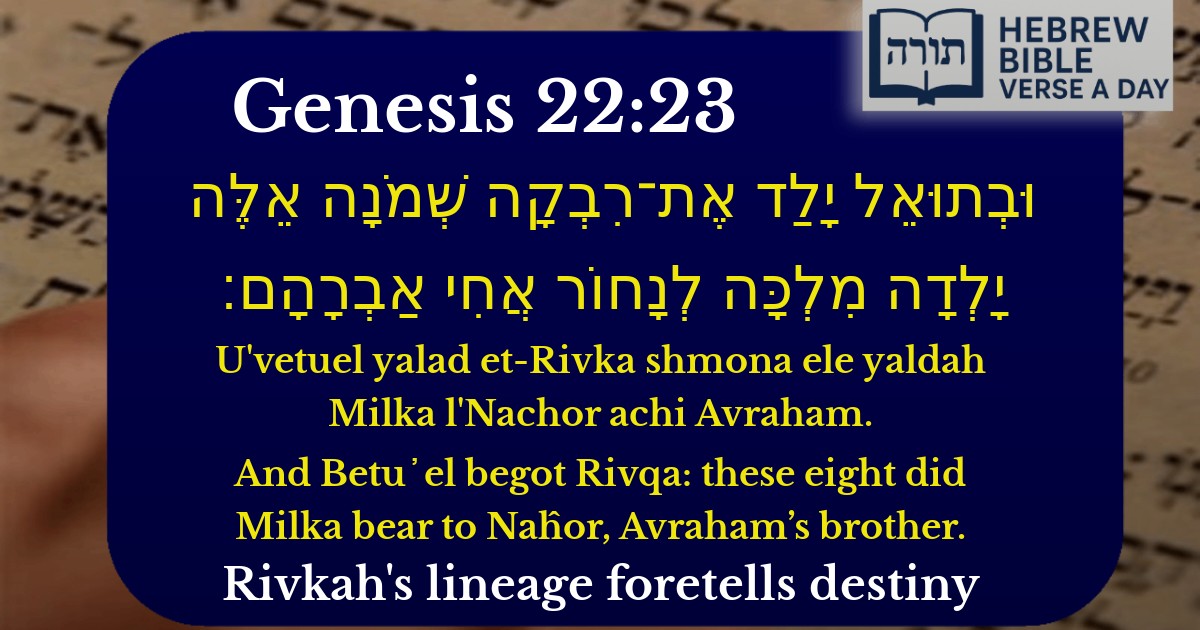Frequently Asked Questions
Q: Who was Rivka (Rebecca) in the Torah?
A: Rivka (Rebecca) was the daughter of Betuel and the granddaughter of Nahor, Avraham's brother. She later became the wife of Yitzchak (Isaac) and the mother of Yaakov (Jacob) and Esav (Esau), playing a key role in Jewish history. The Torah introduces her lineage here to show her noble family connection to Avraham.
Q: Why does the Torah mention that Milka bore eight children to Nahor?
A: The Torah emphasizes that Milka bore eight children to Nahor (Avraham's brother) to highlight the fulfillment of God's blessing of fertility given to Avraham's family. Rashi notes that this mirrors the blessing of Avraham's own descendants, showing divine providence in both family lines.
Q: What is the significance of Rivka's lineage being mentioned here?
A: Rivka's lineage is mentioned to show her righteous ancestry, as she descended from Avraham's family. The Midrash teaches that Rivka was destined for greatness, as she would later become a matriarch of the Jewish people. This verse sets the stage for her future role in the Torah narrative.
Q: How does this verse connect to the story of the Akeidah (Binding of Isaac)?
A: This verse appears right after the Akeidah (Genesis 22) to hint at the next phase in Jewish history—finding a wife for Yitzchak. The Torah subtly introduces Rivka here, showing that God had already prepared a righteous match for Yitzchak even before the Akeidah took place.
Q: Why is Rivka's family important in Jewish tradition?
A: Rivka's family is important because they maintained a connection to Avraham's monotheistic beliefs, unlike other branches of Terach's descendants. The Talmud (Yevamot 64b) notes that Rivka was born into a worthy family, which is why she was chosen to continue the legacy of Avraham and Sarah as a matriarch.


Context in the Torah
The verse (Bereishit 22:23) appears in the narrative following the Akeidah (Binding of Yitzchak) and lists the descendants of Nachor, Avraham's brother. This lineage is significant because it introduces Rivka (Rebecca), who will later become the wife of Yitzchak and one of the Imahot (Matriarchs) of the Jewish people.
Rashi's Commentary
Rashi explains that the Torah mentions Rivka here to connect the story of the Akeidah with the future marriage of Yitzchak. He notes that this verse serves as a precursor to the next chapter, where Avraham sends his servant to find a wife for Yitzchak from his family in Charan. The mention of "these eight" refers to the eight children born to Milka, Nachor's wife, emphasizing Rivka's pure lineage from Avraham's family.
Significance of the Number Eight
The Midrash (Bereishit Rabbah 57:3) highlights that the number eight is symbolic in Jewish tradition, representing transcendence beyond nature (since seven represents the natural order, such as the seven days of creation). The fact that Milka bore eight children to Nachor may allude to the providential role Rivka would play in continuing Avraham's spiritual legacy.
Rivka's Role in Jewish History
Betu'el and Rivka's Family
Betu'el, Rivka's father, is later identified in the Torah as a figure associated with deception (as seen in the negotiations with Eliezer in Bereishit 24). However, Rivka emerges as a righteous woman despite her familial environment, demonstrating the principle of zechut avot (merit of the ancestors) and individual spiritual greatness.